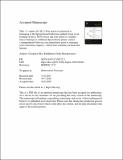Files in this item
Vocal tract constancy in birds and humans
Item metadata
| dc.contributor.author | Pike, Cleopatra | |
| dc.contributor.author | Kriengwatana, Buddhamas Pralle | |
| dc.date.accessioned | 2019-08-22T23:44:16Z | |
| dc.date.available | 2019-08-22T23:44:16Z | |
| dc.date.issued | 2018-08-23 | |
| dc.identifier | 255579861 | |
| dc.identifier | 7d9db2ef-2d44-4c79-87ee-3de8ccd5e9b8 | |
| dc.identifier | 85056307311 | |
| dc.identifier | 000474317900013 | |
| dc.identifier.citation | Pike , C & Kriengwatana , B P 2018 , ' Vocal tract constancy in birds and humans ' , Behavioural Processes , vol. In press . https://doi.org/10.1016/j.beproc.2018.08.001 | en |
| dc.identifier.issn | 0376-6357 | |
| dc.identifier.other | RIS: urn:112D94CD238691E7DC240CE8BDBB1A9A | |
| dc.identifier.uri | https://hdl.handle.net/10023/18358 | |
| dc.description.abstract | Humans perceive speech as relatively stable despite acoustic variation caused by vocal tract (VT) differences between speakers. Humans use perceptual ‘vocal tract normalisation’ (VTN) and other processes to achieve this stability. Similarity in vocal apparatus/acoustics between birds and humans means that birds might also experience VT variation. This has the potential to impede bird communication. No known studies have explicitly examined this, but a number of studies show perceptual stability or ‘perceptual constancy’ in birds similar to that seen in humans when dealing with VT variation. This review explores similarities between birds and humans and concludes that birds show sufficient evidence of perceptual constancy to warrant further research in this area. Future work should 1) quantify the multiple sources of variation in bird vocalisations, including, but not limited to VT variations, 2) determine whether vocalisations are perniciously disrupted by any of these and 3) investigate how birds reduce variation to maintain perceptual constancy and perceptual efficiency. | |
| dc.format.extent | 1363326 | |
| dc.language.iso | eng | |
| dc.relation.ispartof | Behavioural Processes | en |
| dc.subject | Vocal tract normalisation | en |
| dc.subject | Auditory constancy | en |
| dc.subject | Bird song | en |
| dc.subject | Speech | en |
| dc.subject | Categorical perception | en |
| dc.subject | Spectral contrast | en |
| dc.subject | Spectral compensation effect | en |
| dc.subject | Auditory afterimage | en |
| dc.subject | BF Psychology | en |
| dc.subject.lcc | BF | en |
| dc.title | Vocal tract constancy in birds and humans | en |
| dc.type | Journal item | en |
| dc.contributor.institution | University of St Andrews. School of Psychology and Neuroscience | en |
| dc.identifier.doi | 10.1016/j.beproc.2018.08.001 | |
| dc.description.status | Peer reviewed | en |
| dc.date.embargoedUntil | 2019-08-23 |
This item appears in the following Collection(s)
Items in the St Andrews Research Repository are protected by copyright, with all rights reserved, unless otherwise indicated.

